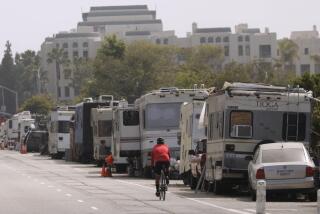Starting next year you could be fined for parking within 20 feet of a crosswalk in L.A.

- Share via
Starting Jan. 1 you could be cited for parking within 20 feet of a crosswalk even if there’s no warning sign or painted red curb under a statewide parking law that’s set to be enforced next year.
Assembly Bill 413, or California’s “daylighting” law, went into effect in 2024 and prohibits drivers from stopping, standing or parking their car within 20 feet of a crosswalk and 15 feet of a crosswalk with a curb extension.
During the first year of the law’s implementation, violators were let off with a warning, unless the violation occurred in a properly marked area.
But that warning period ends Jan. 1.
Drivers within the city of Los Angeles should already be used to this rule as the city’s municipal code currently prohibits drivers from parking within 25 feet of “the approach to the nearest line of a crosswalk.”
The rest of Los Angeles County is now falling in line with the state’s law.
Now the only exception for having your car within 20 feet of a crosswalk is “when necessary to avoid traffic conflicts or in compliance with directions from a peace officer or an official traffic control device,” according to a spokesperson from the L.A. County Sheriff’s Department parking enforcement detail.
Enforcing the law could prove tricky in unincorporated Los Angeles County and even in Los Angeles, where officials acknowledge they have an unknown number of crosswalks without markings or signage to keep parking drivers 20 feet away.
If a crosswalk isn’t properly labeled, drivers will continue to get a pass.
“In residential areas with low traffic volumes where these restrictions may not be marked, and are not yet enforceable, [the Los Angeles Department of Transportation] will continue to issue warnings until the [Los Angeles Municipal Code] is updated to reflect the change in state law,” said Colin Sweeney, spokesperson for LADOT.
For unincorporated areas, the sheriff’s department said it would take a similar approach, and pointed out that it falls to the Department of Public Works to make sure curbs are painted and signs are posted.
“Collaborating with DPW will be crucial in ensuring clear curb markings and signage are implemented where necessary,” the department said.
Why is this a law?
The goal of Assembly Bill 413 is to increase visibility for everyone when a person is using the crosswalk.
This safety measure called “daylighting” makes it easier for people crossing the street and the person behind the wheel to see each other at a distance when a parked car could otherwise block them from each other’s view.
“Daylighting is a proven way we can make our streets safer for everyone, and 43 other states have already implemented some version of daylighting,” said Assemblymember Alex Lee (D-San José) in a statement. “By making it easier for motorists, pedestrians, and bicyclists to see each other at intersections, we can take a simple and important step to help us all safely share the road.”
According to the California Office of Traffic Safety, the state’s pedestrian fatality rate is more then 25% higher than the national average.
In 2020, 26% of bicyclist and other cyclist fatalities occurred at intersections, which according to the National Highway Traffic Safety Administration, “are extremely hazardous for bicyclists and present a high risk for crashes where bicyclists cross paths with motorists.”
Parts of California including the city of Los Angeles, San Francisco and Alameda already have a version of this pedestrian safety rule in place, however the California “daylighting” law creates a uniform rule across the state.
What happens if I park within the 20 or 15 feet prohibited area?
You might as well adapt to the new law because if you do park, idle or stop in a marked spot within the prohibited 20 feet, in the city of Los Angeles you will be subject to a $93 fine.
How can I measure 20 feet from a crosswalk?
You don’t have to carry around a measuring tape just for the next time you’re looking for parking and come across a space that’s somewhat close to a crosswalk, authorities say.
When you’re trying to gauge whether your vehicle is 20 feet away from a crosswalk, the sheriff’s department advises that you ask yourself whether a mid-size SUV, which is approximately 15 feet long, fits between you and the crosswalk.
If the mid-size SUV does fit, with a little more wiggle room, you’re in the clear. If another vehicle does not fit between your car and the crosswalk, you’ll need to look for another parking spot.
More to Read
Sign up for Essential California
The most important California stories and recommendations in your inbox every morning.
You may occasionally receive promotional content from the Los Angeles Times.











